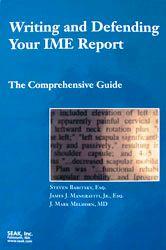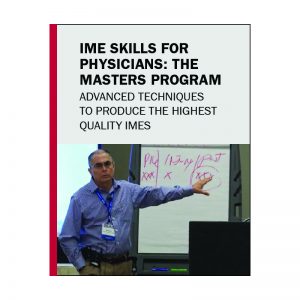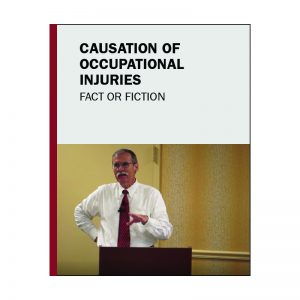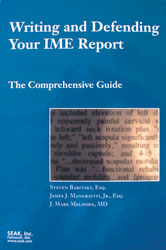 The 10 Biggest Mistakes Physicians Make in Writing Their IME Reports
The 10 Biggest Mistakes Physicians Make in Writing Their IME Reports
By Steven Babitsky, Esq.
The Independent Medical Evaluation (IME) reports that physicians prepare are playing an increasingly important role in workers’ compensation cases, personal injury litigation, and long-term disability claims. Each year physicians prepare hundreds of thousands of IME reports which are read and utilized by judges, hearing officers, and plaintiff and defense attorneys to decide and settle claims. Physicians are frequently called upon at depositions, hearings, or trials to support, justify, and defend each and every word of their IME reports.
With this in mind, we turn to the 10 biggest mistakes IME physicians make in writing their reports.
Mistake #1 Not Answering the Questions Asked
Physicians frequently do not answer the questions posed by the referring client. These physicians either opine in areas they were not requested to address or do not answer questions posed by the client.
Action Step Physicians should have a clear understanding of the questions the referring client wants answered and should check their report to make sure they answer only these questions in their report.
Mistake #2 Expressing Opinions Outside Their True Areas of Expertise
Physicians make the mistake of straying from their areas of expertise and expressing opinions in areas in which they are not truly an expert in. Some examples include opining in areas outside of their medical discipline and specialty and using legal and other terms for which they do not know the definition.
FREE Whitepaper: Guide to Providing Independent Medical Exams: Click here
Action Step Physicians should stay in their sandbox (area of true expertise) and check their reports for words and terms they cannot define.
Mistake #3 Not Listing the Medical Records Reviewed
Physicians mistakenly refer generally to the medical records they reviewed. These physicians open themselves to endless questions about what records they did and did not review.
Action Step Physicians should explicitly list and precisely describe all of the medical records and other documents they reviewed prior to preparing their IME report.
Mistake #4 Not Taking a Detailed, Accurate History
Physicians frequently do not take and document an accurate history into their IME report. This can and will lead to many questions at deposition, hearing, or trial about the inadequate or incorrect history and how that impacts the validity of the physician’s opinions.
Action Step Physicians should include a thorough, well-written, and accurate history as a part of their IME report.
Mistake #5 Not Documenting the Results of the Physical Examination
Physicians often perform a detailed physical examination but make the mistake of not thoroughly documenting the exam. The old medical maxim, “If it is not documented, it was not done,” should be remembered.
Action Step Physicians should check their IME report to make sure that all of the tests performed and all of the findings made are clearly and accurately documented in the report.
Mistake #6 Not Properly Wording Their Opinion
Physicians frequently perform a complete review of the medical records, an extensive physical examination, and a draft detailed IME report which fails due to a poorly worded opinion. Physicians should be mindful of the fact that the main reason for their examination and report is so that they can express their opinion in a legally sufficient and defensible manner.
Action Step Physicians should familiarize themselves with the legal terms of art for expressing their opinions which usually are:
- Based upon a reasonable degree of medical certainty, or
- Based upon a reasonable degree of medical probability.
Mistake #7 Not Properly Proofreading Their Reports
Physicians frequently do not carefully proofread their IME report before it is finalized. Each and every mistake reduces the value of the report and calls into question the precision of the IME physician and the validity of her opinions.
Action Step IME physicians should take all the steps necessary to catch and correct all:
- Misspelled words
- Transcription errors, and
- Grammatical mistakes
before their IME report is finalized and released to clients, attorneys, judges, and hearing officers.
Mistake #8 Expansive and Overly Friendly Transmittal Letters
Physicians can, and often do, ruin an otherwise excellent examination and IME report by including an overly friendly or detailed cover letter to the client. This letter will be used by opposing counsel to show or infer bias.
Action Step Physicians’ cover letters should be short (one sentence), objective, and devoid of any extraneous information.
Mistake #9 Lack of Proper Formatting
Physicians will spend many hours on their review of the records, examination, and dictating their IME report with little or no thought as to how the report is to be formatted. An IME report which is not properly formatted is very difficult to read and is of little value to the client.
Action Step Physicians should use topic headings, 11-point or larger font, and short, concise paragraphs to properly format their IME reports.
Mistake #10 Use of Hedge Words
Physicians, often inadvertently, use hedge words such as “it seems,” “I think,” “I believe,” “it appears,” “it could,” “apparently,” etc. in their IME reports. These hedge words lessen the impact of their findings and conclusions.
Action Step Physicians should use precise, powerful, and persuasive language in their IME reports and avoid using hedge words.
Conclusion
Physicians who follow the action steps outlined above will write more precise, valuable, and defensible IME reports.
About The Author
Steve Babitsky, Esq. is the President of SEAK, Inc. and is the co-author of Writing and Defending Your IME Report: The Comprehensive Guide, and the seminar leader for the seminar IME Skills for Physicians: The Master’s Program.
Best Selling Products for IME Providers
How to Start, Build and Run a Successful IME Practice
[Stream On-Demand]
IME Skills for Physicians: The Master’s Program
[Stream On-Demand]
How To Market & Grow Your IME Practice
[Stream On-Demand]
Causation of Occupational Injuries: Fact or Fiction
[Stream On-Demand]





